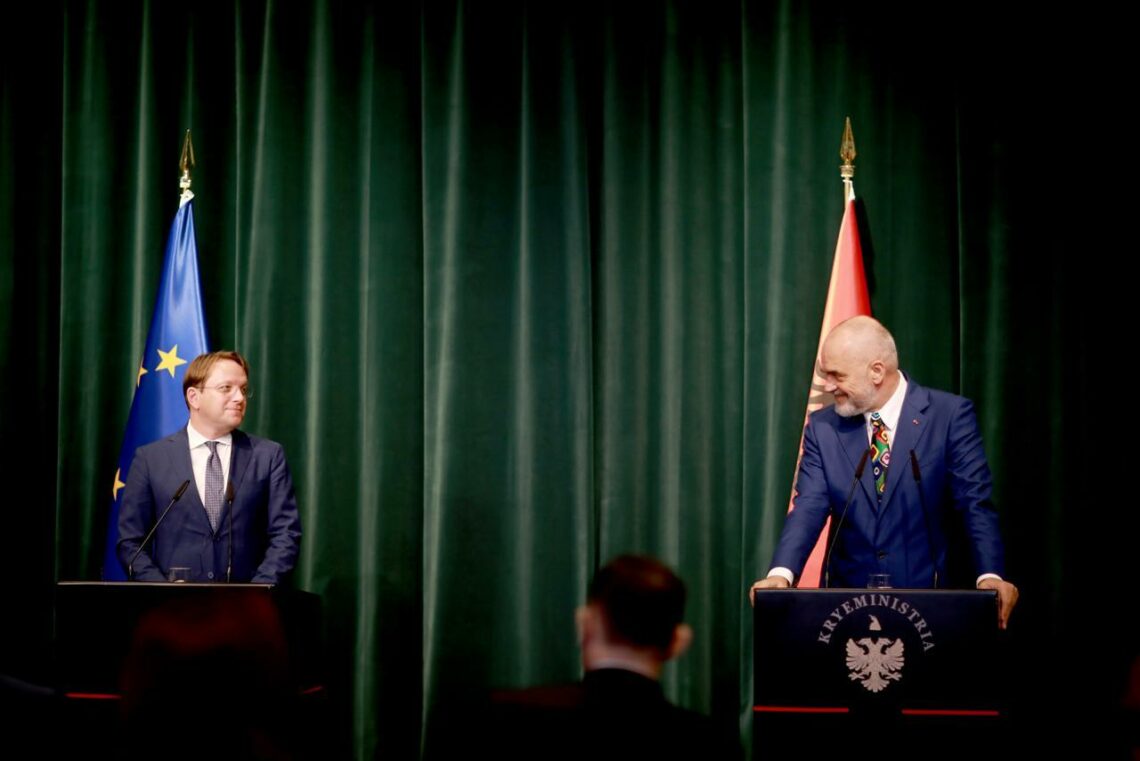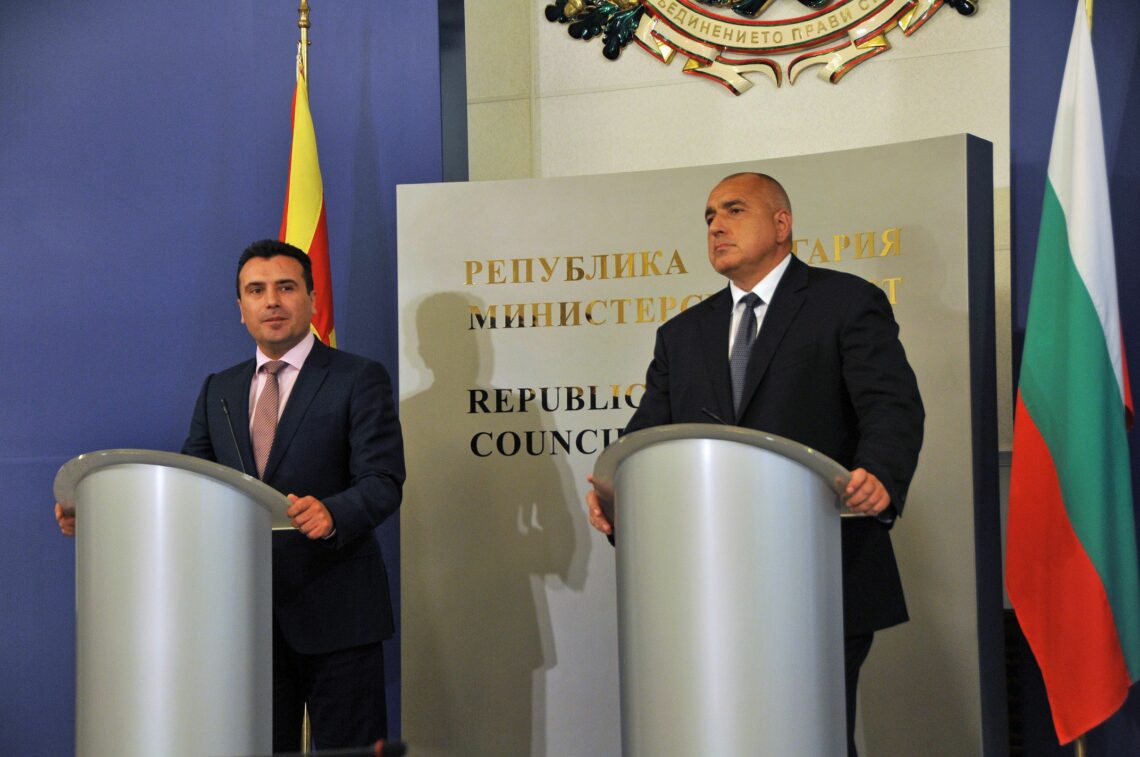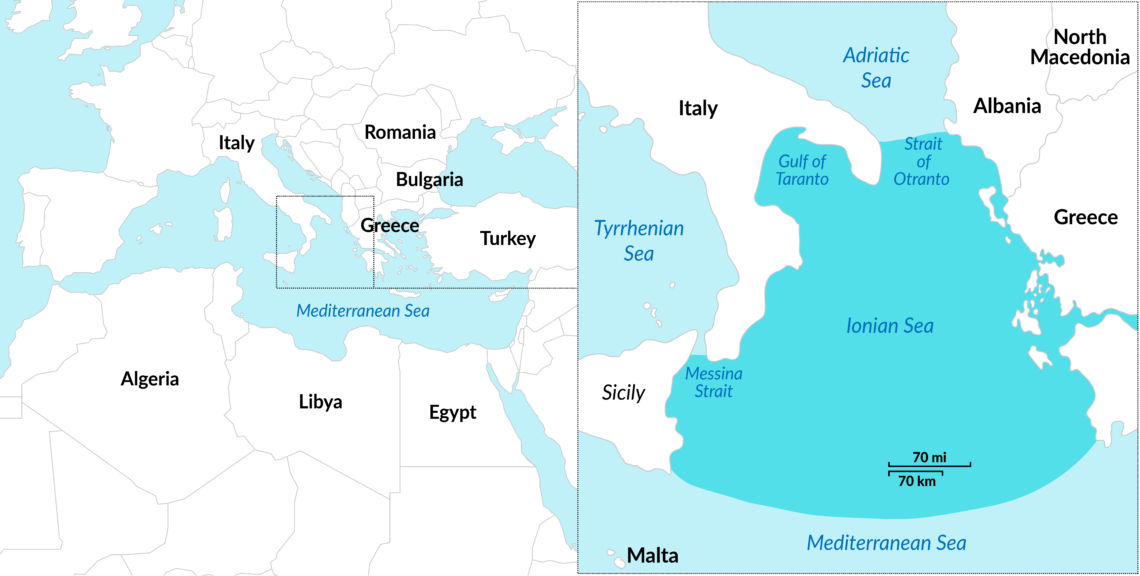Albania and North Macedonia face an uncertain start for EU accession
In December, Albania and North Macedonia are expected to formally start the process for EU accession negotiations. However, both countries face potential vetoes from member states that may prevent the process entirely. Success could rely on German endorsement.

In a nutshell
- Albania and North Macedonia want to start EU accession talks
- Greece or Bulgaria may block the process
- A delay could turn the countries toward Russia and China
By the end of this year, both North Macedonia and Albania are expected to hold their intergovernmental conferences with the European Union, marking the start of accession negotiations with the bloc. The two Western Balkan countries would be the first to negotiate their membership based on the EU’s new accession methodology.
However, whether these meetings will actually be held is up in the air because Bulgaria and Greece are threatening to veto the talks with North Macedonia and Albania, respectively. The spat between Sofia and Skopje is over history and language, while the dispute between Athens and Tirana is over a sea border.
Identity issues
In the case of North Macedonia and Bulgaria, the difficulties stem from the countries’ 2017 Friendship Treaty, which established a commission to resolve disagreements over the countries’ shared history. In late 2019, Skopje walked away from the talks, though discussions resumed in October of this year.
Sofia has warned that unless the issues are resolved, it would veto the start of the intergovernmental conference. In September, Bulgaria sent a memorandum to other EU member states insisting that resolving the issues should be part of North Macedonia’s accession negotiation framework. In the memorandum, Bulgaria said its key concerns were disagreements over North Macedonia’s stances on some historical matters and the status of the Macedonian language, which Sofia maintains is a dialect of Bulgarian.
Bulgaria is holding firm, insisting that if the issues are not resolved, it will block the accession negotiations.
Germany, which holds the rotating EU presidency, has declared that bilateral relations cannot be part of the EU negotiation framework. Yet Bulgaria is holding firm, insisting that if the issues are not resolved, it will block the accession negotiations.
During an October 2020 visit to Skopje, EU Commissioner for Neighborhood and Enlargement Oliver Varhelyi admitted that the dispute could derail North Macedonia’s membership. “It is in the interest of both Bulgaria and North Macedonia to find a solution for the issues that arouse misunderstandings,” he said. “Without clearing them it will be very difficult to go forward.”
Macedonian President Stevo Pendarovski and Prime Minister Zoran Zaev have declared a readiness to compromise. Mr. Zaev has announced that he will meet with Bulgarian Prime Minister Boyko Borisov in November in a last-ditch attempt to convince Bulgaria. Nevertheless, his tone has become more pessimistic. In October he said that if Bulgaria does not budge from its position in the memorandum, “we should prepare the Macedonian people [for the possibility that] the first intergovernmental conference we expect in December may not begin.”

The development is disheartening for North Macedonia, which in 2018 finally resolved its 27-year dispute with Greece over its name. That agreement – ratified by both countries’ parliaments – was thought to open the path for North Macedonia to join the EU. As part of the name-change deal, the countries’ leaders signed three memorandums, all of which still must be ratified by the Greek parliament.
Having gained candidate status in 2005, North Macedonia has been waiting 15 years to start accession negotiations.
Sea border
Albania, for its part, faces two thorny issues that could delay the start of its EU accession negotiations. The first problem is internal: the country still needs to pass electoral and judicial reforms and strengthen the rule of law. For nearly three years its Constitutional Court has been hamstrung due to two unfilled vacancies. The second is the decade-long dispute over its sea border with Greece. Athens is threatening to veto the start of Albania’s accession talks if the disagreement is not resolved.
When it comes to the rule-of-law reforms, the Council of the European Union has adopted 15 conditions (proposed by Germany) that Albania must meet. Yet Tirana is unlikely to take on the issue before April, when parliamentary elections are scheduled.
The sea border issue looks even more difficult to solve because it involves not only bilateral relations between Albania and Greece, but also plays into wider geopolitical tensions in the Eastern Mediterranean. Turkey and Greece – both NATO members – nearly went to war over sovereignty of some of the islands there, near natural gas reserves. Albania, also a member of NATO, is in fact still technically at war with Greece, whose parliament has never abolished a 1940 law declaring war on its northwestern neighbor. The disputed territory in the Ionian Sea also has natural gas reserves.
Facts & figures

In August, Greek Prime Minister Kyriakos Mitsotakis said that Greece would extend its territorial waters in the Ionian Sea from six to 12 nautical miles. The move provoked strong reactions in Albania. Tirana has still not agreed on a sea border with Greece since the two countries’ 2009 agreement on the matter was nullified by the Albanian Constitutional Court. After meeting with representatives of civil society organizations, Albanian President Ilir Meta even raised the possibility of holding a referendum on the issue.
In mid-September, Albanian Prime Minister Edi Rama met Turkish President Recep Tayyip Erdogan just a day before traveling to Athens to meet his Greek counterpart. The move was viewed negatively in Athens. At a conference a day later, Mr. Rama and Theodora Bakoyannis, a member of the Greek parliament, got into a heated exchange in which Ms. Bakoyannis suggested Albania’s scuppering of the 2009 deal came at the behest of Turkey. Ms. Bakoyannis had been Greece’s minister of foreign affairs when that deal was agreed upon. Prime Minister Rama denied her assertion.
In late October 2020, Albania and Greece agreed to refer their maritime border dispute to the International Court of Justice. Until a ruling comes, the issue will likely remain an obstacle for Albania’s accession talks.
Progress needed
By the beginning of October, the EU negotiation framework had not been delivered for either country – a precondition for holding the intergovernmental conferences. Member states are currently reviewing the EU’s draft. For its part, Bulgaria has signaled the need for a bilateral agreement with North Macedonia. There is still time for the negotiation framework to be delivered, likely on November 10 at the meeting of the General Affairs Council.
The European Commission wants the intergovernmental conferences to be held ‘as soon as possible’.
On October 6, the European Commission published its annual enlargement package in which it said that it “looks forward” to the intergovernmental conferences being held “as soon as possible.”
In the case of North Macedonia, the report noted “moderate progress in public administration reform” and some progress in fighting corruption. It also emphasized the importance of continuing to implement bilateral agreements with Greece and Bulgaria.
For Albania, the report found that the country’s political environment was intensely polarized and that Tirana still needed to address several issues before the intergovernmental conference, especially corruption in the judicial system. It also pointed out that Albania needed to make more progress on outstanding bilateral issues with Greece.
New methodology
Albania and North Macedonia will be the first two countries to start accession negotiations based on a new EU methodology adopted at the beginning of this year. The old process, which included the opening and closing of various “chapters” of requirements that had to be met, was replaced with a system of six “clusters” of chapters that can be opened all at once, rather than individually.
The idea was to avoid repeating the cases of Montenegro (which in seven years of negotiations, opened 32 chapters but only closed two) and Serbia (which opened 18 out of 35 chapters but has not opened any new ones in 2020). The EU also wanted to give to the process more predictability and credibility.
The first intergovernmental conference will probably be held by mid-December of this year, under the current German presidency, while the accession negotiations could start in earnest in 2022, during the French presidency. It is crucial that the process starts under German leadership, with all of Berlin’s political weight behind it. In 2021, the much smaller Slovenia and Portugal will hold the rotating presidency.
Waiting another decade to bring Albania and North Macedonia into the EU fold is a risky proposition.
Judiciary reform is the key EU concern for Albania, and it is also a top priority for the new government of North Macedonia. The question is how these countries can deliver tangible reforms in just a few weeks on an issue they have struggled with for years. Albania’s Constitutional Court has been unable to function properly for three years, while in North Macedonia, a recent survey found that four out of five people consider the judicial system the most corrupt public institution.
While there are plenty of uncertainties that go along with the accession process, waiting another decade to bring Albania and North Macedonia into the EU fold is a risky proposition. As EU Minister for Foreign Affairs Josep Borrell pointed out, the bloc is “not complete” without the Western Balkans. “A credible enlargement policy is an investment in peace and security for the whole of Europe,” he added. And as Italy’s Prime Minister Giuseppe Conte warned, if the EU does not embrace the Balkans, countries in the region could turn toward Russia and China.
To avoid that scenario, Commissioner Varhelyi has argued that reform in the Western Balkans must be “supported by solid and accelerated economic growth and developing functioning market economies, which will help to speed up reforms and their delivery.”
In line with this thinking, the EU announced that it would invest 9 billion euros in the Western Balkans to help develop transport and energy infrastructure and spur economic growth. Later, the bloc said it was looking to secure some 20 billion euros more to help the region catch up economically.
Scenarios
Taking all this into account, it seems likely that Germany will use its political weight during its EU presidency to push forward the accession agenda for both countries, if Bulgaria and Greece do not veto the move.
If the intergovernmental conferences are held in December, it will most likely take at least 18 months of hard work to convince Brussels that both countries are ready to open the first clusters at the beginning of 2022, when France holds the rotating presidency.
Even with the new methodology, it is still possible that either or both of the countries could take eight or nine years to complete all of the accession requirements, allowing them to join only in 2030. Given the political will involved on both sides, however, that outcome currently seems less likely.








